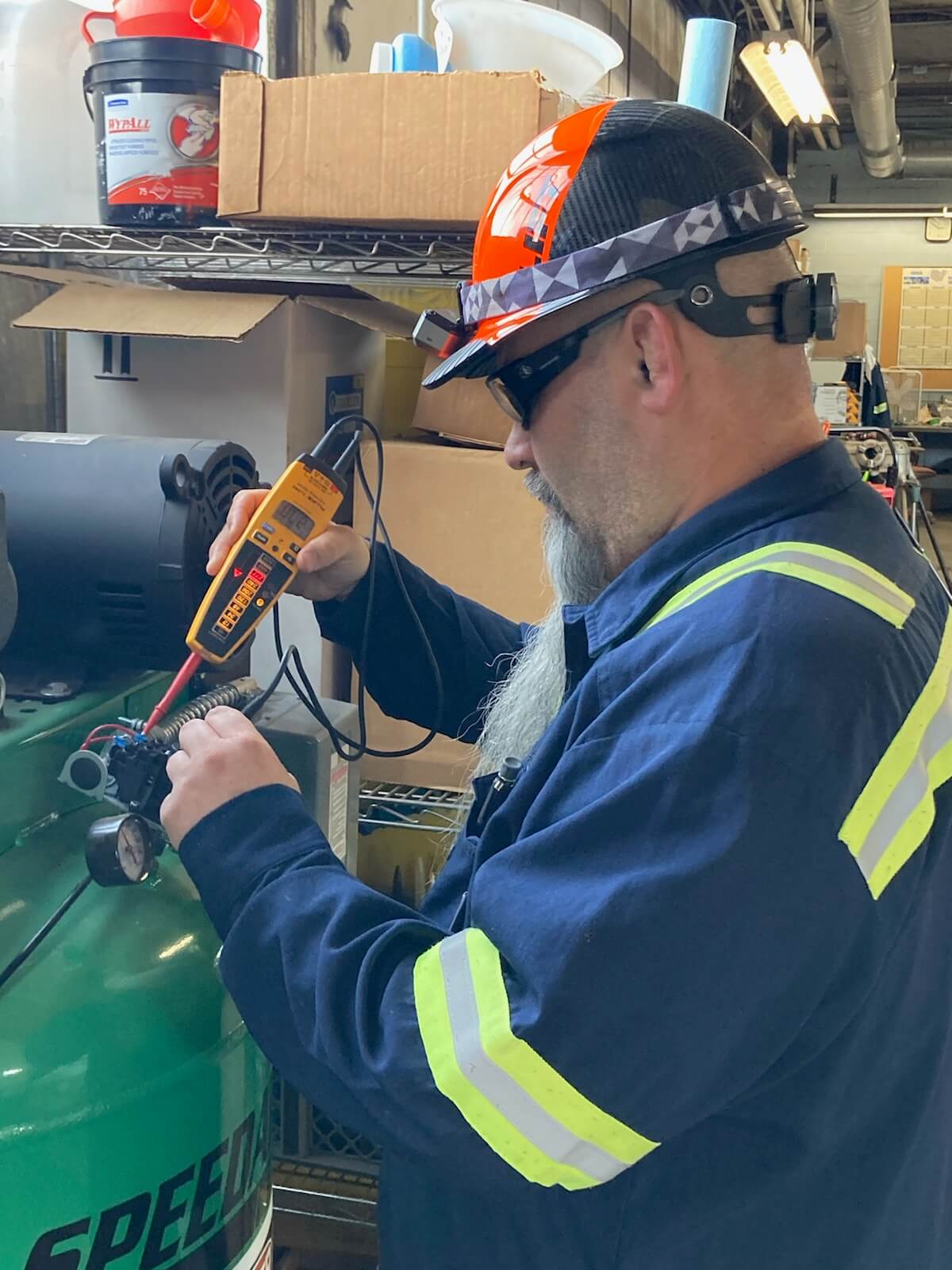
In this post, Chris W., whose maintenance career is truly extraordinary, talks about his “6 Maintenance Career Lessons Learned.”Has anyone ever underestimated you? We’ve all been there at one time or another. Someone thinks we’re too young, too old, or too “something.”
My first experience playing the underdog happened when I was 18 years old. Nordstrom had just hired me as an entry-level maintenance technician. It was my first real job, and I was stoked! Even though the only task my supervisor trusted me to do—without causing the whole operation to shut down—was to change the light bulbs.

Little did I know that I made $20,000 in my junior year of high school, helping my neighbor fix things around his garage after school. Mr. Smith worked for an electro-mechanical organization and was kind enough to take me under his wing. During this time, I also learned carpentry, welding, and HVAC through a vocational program offered by my high school. But back to Nordstrom: a few days into the job, I saw an older technician struggling to fix a light.
“Do you have power?” I asked. “It could be an issue with a wire, the breaker, or several other things even though the switch is on.” Much to his amazement, I quickly discovered the culprit was a bad ballast. My supervisors promoted me the following week. Over the next several years, I worked my way up to regional maintenance manager before eventually returning to my roots in the industrial maintenance sector. This is the maintenance career I hoped for.
6 Tips for a Successful Maintenance Career
Time and time again, early work experiences enforced important points:
- Maintenance can be lucrative.
- Never judge a book by its cover.
- There is always more than one path to career advancement.
Every so often, someone asks me for advice on how to succeed in a maintenance career. Depending on their exposure to the field, they don’t always realize the breadth of possibilities available to them.
A variety of industries—manufacturing, aviation, hospitality, oil and gas, etc.—rely on maintenance technicians to maintain the reliability of various assets. In fact, the U.S. Bureau of Labor Statistics expects the job outlook for general maintenance career to increase by 7 percent between 2016 and 2026! Are you considering a maintenance career?
Below are my six best tips for those contemplating a maintenance career:

1. Build Your Maintenance Career: Know Your Values, Preferences, and Temperament
Did you find yourself drawn toward tinkering with broken items at a young age? Did you grow up watching someone fix things around the house? If so, you may have naturally gravitated toward working in a maintenance role of some kind.
It’s true—you can learn many of the technical skills necessary for maintenance career advancement on the job from family members and in vocational programs. But, besides having an innate curiosity for how things work, maintenance technicians must possess a variety of characteristics. The best technicians I know are hardworking, inquisitive, helpful, and calm under pressure. Why does this matter?
High-value initiatives will fail or succeed based on the work you do. You never know what kind of mechanical issues you will face each day. For this reason, it’s important to make sure you’re comfortable with the level of pressure the maintenance work you’re considering actually entails. In addition, consider your values when thinking about your maintenance career trajectory. Some maintenance roles involve significant travel. For example, Nordstrom had me traveling eight months out of the year during my managerial stint.
While the extended travel was exciting for a while, it ultimately didn’t align with my value of starting a family. Eventually, I gravitated toward the stability of food-grade manufacturing, and then chemical manufacturing, because of the more stable schedule. All these years later, I have gone deep into my maintenance career and am considered an expert in many areas of maintenance workflows.

2. Prioritize Employers Who Support Your Maintenance Career
When people ask about my day-to-day, I always tell them: I’m a “working manager.” That means I operate a service vehicle in addition to strategizing maintenance initiatives, analyzing equipment data, and scheduling PMs.
But my favorite part of the job, by far, is training my guys! I take pride in equipping them with lifelong skills that will help them advance in their maintenance careers. With that said, not every organization nurtures its own talent. That’s not to say they don’t care. Balancing one-on-one attention with emergency maintenance requests backed up on top of existing PM can be challenging. But the best maintenance departments find the time to mentor entry-level technicians.
3. Be a Team Player
Before I hire someone, I always ask: do you truly know what it means to be a team member? Our team works long hours and in harsh conditions. If we can’t lean on one another when proverbial sh%t hits the fan, it’s not going to work.
For example, say I’m working on a hefty, four-inch pump. If I call one of my guys and say I need help, they might already be behind the eight ball on their stuff. But they will stop what they’re doing to help me, and I will do the same.
In my department, there is no such thing as “I’m busy, so find someone else! That’s a cancer in my department, and I can’t have it.”
It doesn’t matter if you’re plunging toilets, changing light bulbs, or picking garbage off the ground—do it right and do it professionally. Wherever you work, I can promise that your manager will notice, appreciate, and value a professional attitude. You can’t expect to build a maintenance career without being a team player.

4. Take Safety Compliance Seriously
At our chemical plant, everything we work on is trying to kill us. That might sound like an exaggeration, but the reality of the job is serious. Make one careless mistake, and you’re not going home to your family. Fail to properly lock out a machine and a gear could eat your arm off. Forget to turn off the power before you reach into a control box, and 480 volts will destroy you!
With some jobs, you can cut corners, and you’re probably not going to get hurt. But you can’t have that kind of attitude with an industrial maintenance career! In fact, I would probably forgive you for swiping a tool as a first offense. But if you break our constitution? You’re gone. I can’t have somebody’s life at risk because you didn’t complete your assigned PM to check our tanks’ ventilation systems.
For this reason, it’s paramount that you understand the stress level associated with working in any facility before coming on board. Not only are you responsible for maintaining the longevity of organizational equipment, but you’re also responsible for safeguarding the lives of others.
5. Never Stop Learning
Generally speaking, we teach young adults that they must obtain college degrees to be financially stable. While I would never detract from the value of higher education, this just isn’t true. Early on, some friends mocked me for choosing the vocational school route. Ironically, none of them is doing what they went to school for now! And I achieved the equivalent of a four-year degree program decades ago. And my maintenance career has grown as I have grown.
Since my entrance into the world of maintenance more than 30 years ago, I’ve averaged one class per year. Sometimes it was night school, other times, it was online courses. The good news? There isn’t one path to success. The easiest way to begin is to choose a specification such as an electrician, plumber, or welder. It’s customary to work for two years while receiving certification. Accredited training, trade schools, and vocational schools are all viable options.

6. Become CMMS Proficient
Finally, familiarize yourself with computerized maintenance management systems (CMMS) to get a leg up on the competition. An increasing number of facilities in industries across the board are leveraging cloud-based work order software platforms and IoT technologies to organize their maintenance programs. Using a CMMS is practically a given in maintenance careers these days.
Build Your Maintenance Career with MaintainX
While many smaller businesses are still using manual work order and asset management methods, they are likely to switch to digital in the near future. At my facility, we use MaintainX CMMS to create, send, and monitor work orders; catalog equipment information; monitor time, cost, and meter activity; and automate inventory fulfillment. Not only does this save our team hours of paperwork each week, but it also allows us to instant message each other throughout the workday.
Having everything in one place has become indispensable to running a tight ship. Experience with CMMS will definitely strengthen your competitiveness as you plan out your maintenance career.
FAQs

Caroline Eisner is a writer and editor with experience across the profit and nonprofit sectors, government, education, and financial organizations. She has held leadership positions in K16 institutions and has led large-scale digital projects, interactive websites, and a business writing consultancy.




